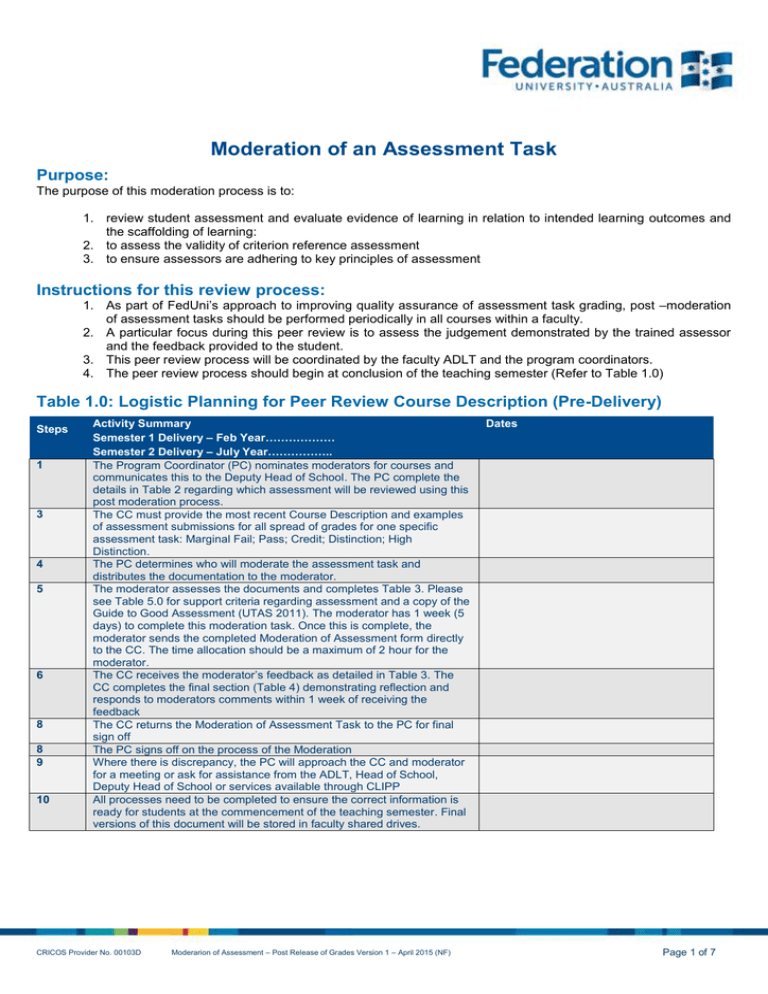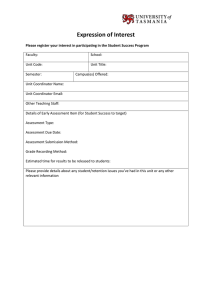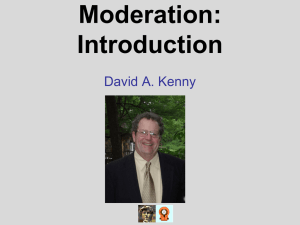Moderation of an Assessment Task Purpose:
advertisement

Moderation of an Assessment Task Purpose: The purpose of this moderation process is to: 1. review student assessment and evaluate evidence of learning in relation to intended learning outcomes and the scaffolding of learning: 2. to assess the validity of criterion reference assessment 3. to ensure assessors are adhering to key principles of assessment Instructions for this review process: 1. As part of FedUni’s approach to improving quality assurance of assessment task grading, post –moderation of assessment tasks should be performed periodically in all courses within a faculty. 2. A particular focus during this peer review is to assess the judgement demonstrated by the trained assessor and the feedback provided to the student. 3. This peer review process will be coordinated by the faculty ADLT and the program coordinators. 4. The peer review process should begin at conclusion of the teaching semester (Refer to Table 1.0) Table 1.0: Logistic Planning for Peer Review Course Description (Pre-Delivery) Steps 1 3 4 5 6 8 8 9 10 Activity Summary Semester 1 Delivery – Feb Year……………… Semester 2 Delivery – July Year…………….. The Program Coordinator (PC) nominates moderators for courses and communicates this to the Deputy Head of School. The PC complete the details in Table 2 regarding which assessment will be reviewed using this post moderation process. The CC must provide the most recent Course Description and examples of assessment submissions for all spread of grades for one specific assessment task: Marginal Fail; Pass; Credit; Distinction; High Distinction. The PC determines who will moderate the assessment task and distributes the documentation to the moderator. The moderator assesses the documents and completes Table 3. Please see Table 5.0 for support criteria regarding assessment and a copy of the Guide to Good Assessment (UTAS 2011). The moderator has 1 week (5 days) to complete this moderation task. Once this is complete, the moderator sends the completed Moderation of Assessment form directly to the CC. The time allocation should be a maximum of 2 hour for the moderator. The CC receives the moderator’s feedback as detailed in Table 3. The CC completes the final section (Table 4) demonstrating reflection and responds to moderators comments within 1 week of receiving the feedback The CC returns the Moderation of Assessment Task to the PC for final sign off The PC signs off on the process of the Moderation Where there is discrepancy, the PC will approach the CC and moderator for a meeting or ask for assistance from the ADLT, Head of School, Deputy Head of School or services available through CLIPP All processes need to be completed to ensure the correct information is ready for students at the commencement of the teaching semester. Final versions of this document will be stored in faculty shared drives. CRICOS Provider No. 00103D Moderarion of Assessment – Post Release of Grades Version 1 – April 2015 (NF) Dates Page 1 of 7 There are a series of question asked as part of this Moderation of Assessment peer review process. If any of the questions elicit a “no” response the moderator should detail their concerns in the “Additional Comments” section. If no agreement can be reached, or the moderator does not respond within one week, then the Program Coordinator should be contacted for advice. If all the answers to the questions is “yes”, then the moderator should sign-off on the review, make any final comments and return this form to the course coordinator. Table 2: Course Coordinator and Moderator Details Program: Location: Course Code: Course Name: Course Coordinator Name: Semester/Year: Assessment No: Assessment Description: Moderator Name: Table 3: Moderation of Assessment Task Focus: Moderator to make comments are reviewing the assessment tasks, assessor feedback and final judgement grade Key question 1. Has the marking guide or rubric been effective in making judgements on the student work? 2. What type of feedback is provided to student(s)? (Summative or Formative). CRICOS Provider No. 00103D Moderarion of Assessment – Post Release of Grades Version 1 – April 2015 (NF) Page 2 of 7 3. Do you believe sufficient, meaningful feedback is supplied in a timely period to the student to improve student future performance? 4. Please provide any additional specific issues you feel need to be considered or general comments about the assessment here. 5. Has the marking guide or rubric been effective in making judgements on the student work? CRICOS Provider No. 00103D Moderarion of Assessment – Post Release of Grades Version 1 – April 2015 (NF) Page 3 of 7 6. What type of feedback is provided to student(s)? (Summative or Formative). 7. Do you believe sufficient, meaningful feedback is supplied in a timely period to the student to improve student future performance? 8. Please provide any additional specific issues you feel need to be considered or general comments about the assessment here. CRICOS Provider No. 00103D Moderarion of Assessment – Post Release of Grades Version 1 – April 2015 (NF) Page 4 of 7 9. Has the marking guide or rubric been effective in making judgements on the student work? 10. What type of feedback is provided to student(s)? (Summative or Formative). 11. Do you believe sufficient, meaningful feedback is supplied in a timely period to the student to improve student future performance? Additional Comments/Suggestions: CRICOS Provider No. 00103D Moderarion of Assessment – Post Release of Grades Version 1 – April 2015 (NF) Page 5 of 7 When completed please upload this document into an agreed location for the Course Coordinator to access (faculty L drive), university electronic management system or send via email. Table 4: Course Coordinator responds to the moderator comments Course Coordinator Comments/Responses (Date…………..) Futures Directions/Strategies for improvement (Tick) Make minor amendments as per feedback & suggestions (Yr………..) Make major amendments & discuss these with Program Coordinator Seek 1-on-1 Peer review with ADLT and/or CLIPP support Use this process as part of reflective practice in my teaching & PRDP (Compulsory) Explore action research opportunities based on my teaching practice; Explore scholarship of learning and teaching opportunities; contact CLIPP Course Coordinator completion date: CRICOS Provider No. 00103D Program Coordinator receipt date and closing remarks: Moderarion of Assessment – Post Release of Grades Version 1 – April 2015 (NF) Page 6 of 7 Table 5: Principles of Assessment: Support material for the moderator Principle 1 Assessment should be seen as an integral part of the learning and teaching cycle. Principle 2 Assessment has four key purposes and these should be considered when developing assessment tasks and learning experiences for students in a course of study. Principle 3 Assessment practices and processes must be transparent and fair. This principle is achieved when: there is a clear alignment between stated learning outcomes (or objectives), the learning experiences provided for students, and the assessment tasks student understanding of the assessment process is facilitated by clear explanations of the assessment tasks, how the assessment tasks relate to the learning outcomes, and the criteria and standards against which students will be assessed assessment tasks are designed to assess relevant UB graduate attributes as well as discipline-specific criteria there is a clear progression in the assessment requirements within a course and through the progress of a program and assessment tasks assess the capacity to analyze and synthesize information and concepts, not just recall the information previously presented These purposes are to: guide students’ development of meaningful learning inform the students of their progress inform staff on the progress of students, and the effectiveness of their teaching provide data for Schools and Faculties to: arrive at final grades for students in a course of study & make decisions on the awarding of a qualification and rank students for awards or progress to another level of study ensure academic quality and standards are upheld and maintained at UB This principle is achieved when: assessment supports student learning and tests their achievement by providing clear opportunities to demonstrate their learning and skill development assessment provides students with descriptions of their progress against stated learning outcomes, criteria and achievement assessment feedback provided to students is both detailed and constructive, returned in a timely manner, and allows students to benefit in the preparation of future assessment tasks feedback from assessment tasks (and other sources) provides clear information for staff to make judgments about students’ progress against the criteria and standards, and enables them to evaluate the effectiveness of teaching assessment tasks are weighted to balance the developmental (‘formative’) and judgmental (‘summative’) roles of assessment. That is, early low-stakes, low-weight assessment should be used to provide students with constructive feedback to improve their achievement – later assessment tasks of higher weight could be used for summative assessment plagiarism in various forms is minimized through careful task design, clear explanations and education about academic integrity, and monitoring of academic honesty by academic staff. This principle is achieved when: clear criteria and achievement standards for the assessment of student work are made available to students, with the task descriptions at the beginning of the semester assessment tasks are designed to ensure there are no inherent biases that may disadvantage any student groups the anonymity of students’ work is maintained in the assessment process where this is possible and practical at a year level within a School, scheduling and design of assessment tasks take into considerations student workloads penalties and adjustments, such as late penalties and moderation of grades, are made consistently, and according to clearly articulated policy readily available to students and at a School and University level, there are clear and published processes available to students who request their results be reviewed. Reference: Guidelines for Good Assessment Practice; Three Principles of Assessment. UTAS Publication (2011) The end CRICOS Provider No. 00103D Moderarion of Assessment – Post Release of Grades Version 1 – April 2015 (NF) Page 7 of 7

